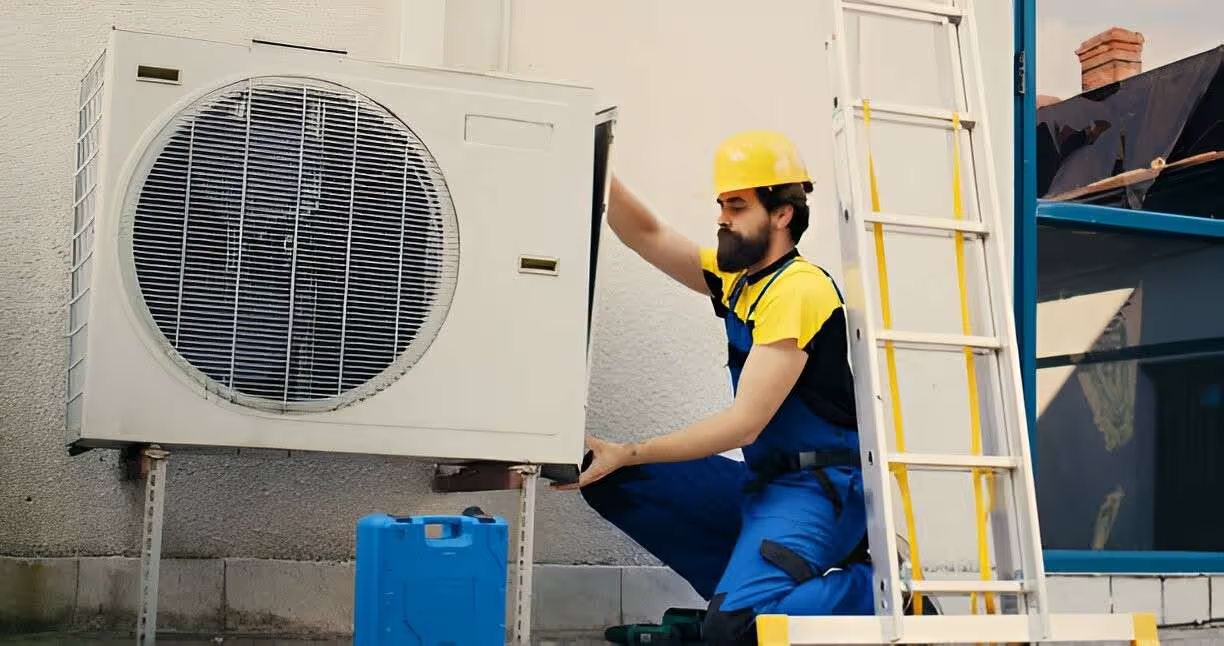Heat Pump Service in St. Petersburg, FL


Common heat pump issues in St. Petersburg, FL
Homes in St. Petersburg face specific stressors that make certain heat pump problems more likely. Expect to see:
- Reduced cooling capacity: Clogged coils, low refrigerant, or failing compressors lead to longer run times and higher bills.
- Salt and corrosion damage: Coastal salt air accelerates rust on outdoor coils, fan motors, and electrical connections.
- Frequent short-cycling or failing to start: Electrical issues, capacitor failure, or improper refrigerant charge cause repeated on-off cycles.
- Poor airflow or uneven temperatures: Dirty filters, duct leaks, or failing blower motors reduce comfort and efficiency.
- Moisture and mold in drain lines and coils: High humidity increases condensate buildup and drain clogs.
- Storm and hurricane-related damage: Wind, debris, and power surges after storms can damage outdoor units and controls.
Understanding these common problems helps prioritize inspections and preventative care that are especially important in St. Petersburg homes.
Service types covered
A full-service heat pump program typically includes:
- Diagnostics and troubleshooting of electrical, refrigerant, airflow, thermostat, and control-system issues.
- Repairs such as replacing capacitors, contactors, motors, compressors, reversing valves, and addressing refrigerant leaks.
- Installations and replacements including load calculations, equipment selection (matched outdoor and indoor components), permitting, and code compliance.
- Preventive maintenance and tune-ups to optimize performance, extend life, and protect warranties.
- Emergency and after-hours response for comfort-critical failures during peak heat or after storms.
- Service agreements that schedule regular visits and prioritize emergency response.
Diagnostic capabilities and what they reveal
A thorough diagnosis combines visual inspection and targeted testing:
- System history and symptom interview to quickly narrow causes.
- Electrical testing to check capacitors, contactors, breakers, and wiring integrity.
- Refrigerant and pressure checks to identify undercharge, overcharge, or leaks.
- Airflow measurements and static pressure to evaluate ductwork and blower performance.
- Coil and condenser inspection for blockages, corrosion, and fin damage common near the coast.
- Thermostat calibration and controls check to confirm accurate temperature sensing and staging.
- Combustion and safety checks where applicable for hybrid systems.
Diagnostics result in a clear repair or replacement recommendation with an itemized estimate and explanation of options suited to your home and local climate.
Repair, replacement, and installation explained
When repairing, technicians prioritize safety and long-term value:
- Repairs focus on restoring efficiency and reliability while considering remaining system life. For older systems with repeated failures, replacement may be more cost-effective.
- Replacement decisions weigh system age, repair history, performance, and energy savings potential. St. Petersburg homeowners benefit from properly sized, high-efficiency units with corrosion-resistant coatings and matched indoor coils or air handlers.
- Installations include load calculations (to avoid under- or oversizing), ductwork inspection and sealing, proper refrigerant charging, electrical upgrades if needed, and permitting to meet Florida Building Code requirements.
New installations should use refrigerants and equipment compliant with current standards and optimized for the local cooling-dominant load. Proper installation is critical to achieve advertised efficiency and reliable operation during long warm seasons.
Maintenance and preventive care
Regular maintenance reduces breakdown risk and restores efficiency:
- Recommended frequency is at least one comprehensive tune-up per year, with a second inspection advisable before peak cooling season given Florida humidity and year-round use. Maintenance tasks typically include:
- Filter replacement or cleaning
- Coil cleaning and inspection for corrosion
- Condensate drain clearing and treatment
- Checking refrigerant levels and looking for leaks
- Electrical and control system checks
- Lubrication and vibration isolation for moving parts
- Calibration of thermostat and control settings
- Enrolling in a maintenance plan often provides priority scheduling during heat waves and documented maintenance that supports warranty and insurance claims after storms.
Pricing structure and transparency
Pricing structures in the industry commonly use a combination of:
- Diagnostic fee for initial troubleshooting that is often applied to repair cost if service is performed.
- Flat-rate pricing for common repairs so you know the cost up front.
- Time and materials for complex or open-ended work.
- Itemized estimates for replacements and major repairs that list parts, labor, permit costs, and expected completion time.
- Warranties on parts and labor that protect against premature failures; factory warranties remain important for new equipment.
Expect transparent, written estimates and an explanation of options so you can compare repair versus replacement based on long-term value, not just immediate cost.
Emergency response and customer support
In St. Petersburg, emergency options are important because extreme heat or post-storm outages can create urgent needs. Emergency support commonly includes:
- After-hours dispatch and rapid triage to assess whether temporary fixes or immediate part replacement are required.
- Priority scheduling for enrolled maintenance clients.
- Temporary solutions where feasible to restore cooling while longer repairs or replacements are arranged.
- Documentation of work and recommendations for resilience improvements, such as surge protection, unit anchoring, or protective coatings that reduce corrosion risk.
Customer support typically provides clear service windows, technician arrival protocols, and post-service documentation describing the work performed and maintenance recommendations.
Why timely heat pump service matters in St. Petersburg
Timely service preserves comfort, reduces energy bills, and prevents secondary problems like mold growth and indoor air quality decline. In St. Petersburg specifically, addressing corrosion, protecting against storm damage, and maintaining dehumidification performance are critical. Regular care also helps ensure compliance with local codes when replacements are necessary and supports insurance documentation after weather events.
What to expect during a service visit
- Technician arrival and identification
- Safety checks and system shutdown when needed
- Diagnostic testing and explanation of findings
- Written estimate for repairs or replacement options
- Execution of agreed work with tests and performance verification
- Cleanup and documentation including warranty details and recommended follow-up
Comprehensive heat pump service in St. Petersburg, FL protects comfort through the seasons, extends equipment life in coastal conditions, and provides the transparency owners need to make informed decisions at every stage of their system lifecycle.
Service Areas


